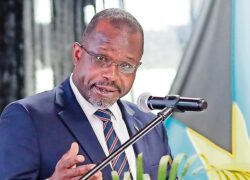
By Deandre Williamson
Journal Staff Writer
Minister of National Security Wayne Munroe said the government anticipates that the 150 Bahamian personnel would be engaged in offering technical and training support to the Haitian National Police.
Munroe’s comments came on Thursday in a response following the government’s commitment to send 150 persons to Haiti to support the multi-national force to help combat violence in the country, once authorized by the United Nations Security Council.
He said this commitment was made because stabilizing the situation in Haiti is important to The Bahamas’ national and regional security.
“The prime minister has emphasized that any involvement of Bahamian personnel will be contingent on negotiations to ensure the effort has widespread support in Haiti, is designed to be effective and results-oriented, and minimizes risk to those involved,” Munroe said.
He noted that The Bahamas “is in no position to bear any additional burdens,” but as long as the situation in Haiti continues to deteriorate, The Bahamas will face expensive and growing burdens associated with incursions into its waters.
The influx of Haitian migrants in The Bahamas has placed a strain on the country, which has more than one hundred thousand square miles of ocean to patrol.
Munroe point out that The Bahamas’ own security requires a comprehensive and aggressive plan to protect its borders that is continuously implemented.
“We have made significant new investments in the Royal Bahamas Defence Force, with hundreds of new recruits, an expansion of our Defence Force fleet, and new equipment and enhanced technological capabilities,” Munroe added.
“We have also strengthened cooperation with key partners like the United States, Turks and Caicos, and Cuba in order to fortify our ability to patrol our borders.
Last year, a record number of migrants were repatriated and there is now a facility in Inagua that allows for faster processing and repatriation.
“We have been very clear that although we are a compassionate nation, our country is in no position to bear any additional burdens,” Munroe said.
“That is why, at the Summit of Americas in June of 2022, hosted by the United States, our prime minister refused to sign a pledge that included a commitment to receive refugees. Twenty-one countries in our hemisphere, including fellow Caribbean nations, signed this agreement, but the prime minister refused and is clear that he will continue to refuse.
Earlier this year, the United Nations called for countries in the region to halt repatriations, and once again, Prime Minister Philip Davis refused.
“We will continue to stand strong in this position,” Munroe said. “We know, however, that with more than one hundred thousand square miles of ocean to patrol, we will continue to see a substantial number of incursions into our waters until the situation in Haiti stabilizes.
“For that reason, we continue to work with regional and international partners to address the security crisis. Last month, CARICOM determined that there was a need to create a Humanitarian and Security Stabilization Corridor under a United Nations Security Council Resolution.”
Earlier this week, the Government of Kenya committed 1,000 personnel to lead a potential multinational force in Haiti under such a resolution, and the Jamaican government also announced plans to send officers.
Munroe noted that Canada has already deployed a CP-140 Aurora long-range patrol aircraft to provide much-needed surveillance and reconnaissance capacity and has also supplied specialized vehicles for the Haitian National Police.


